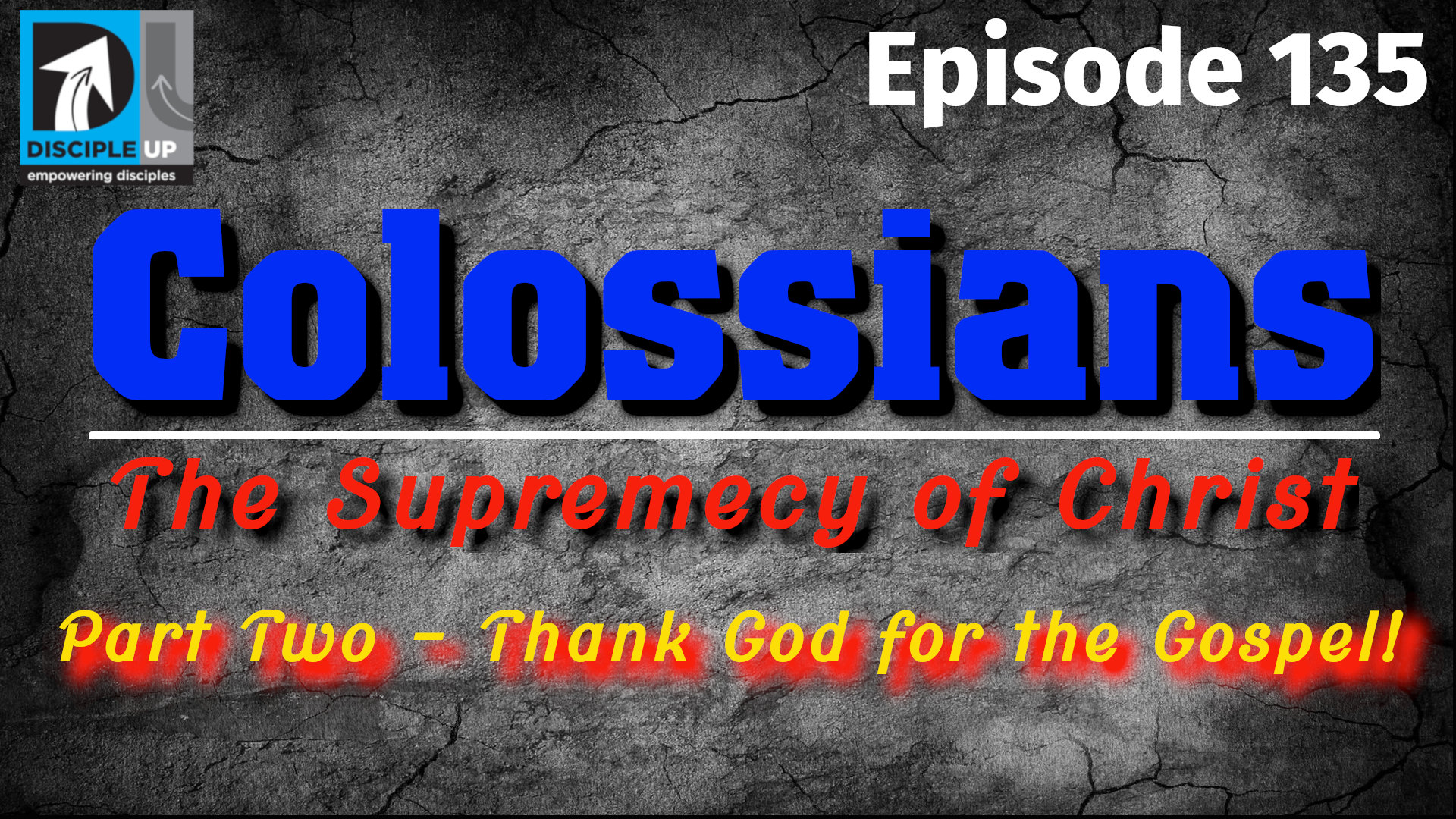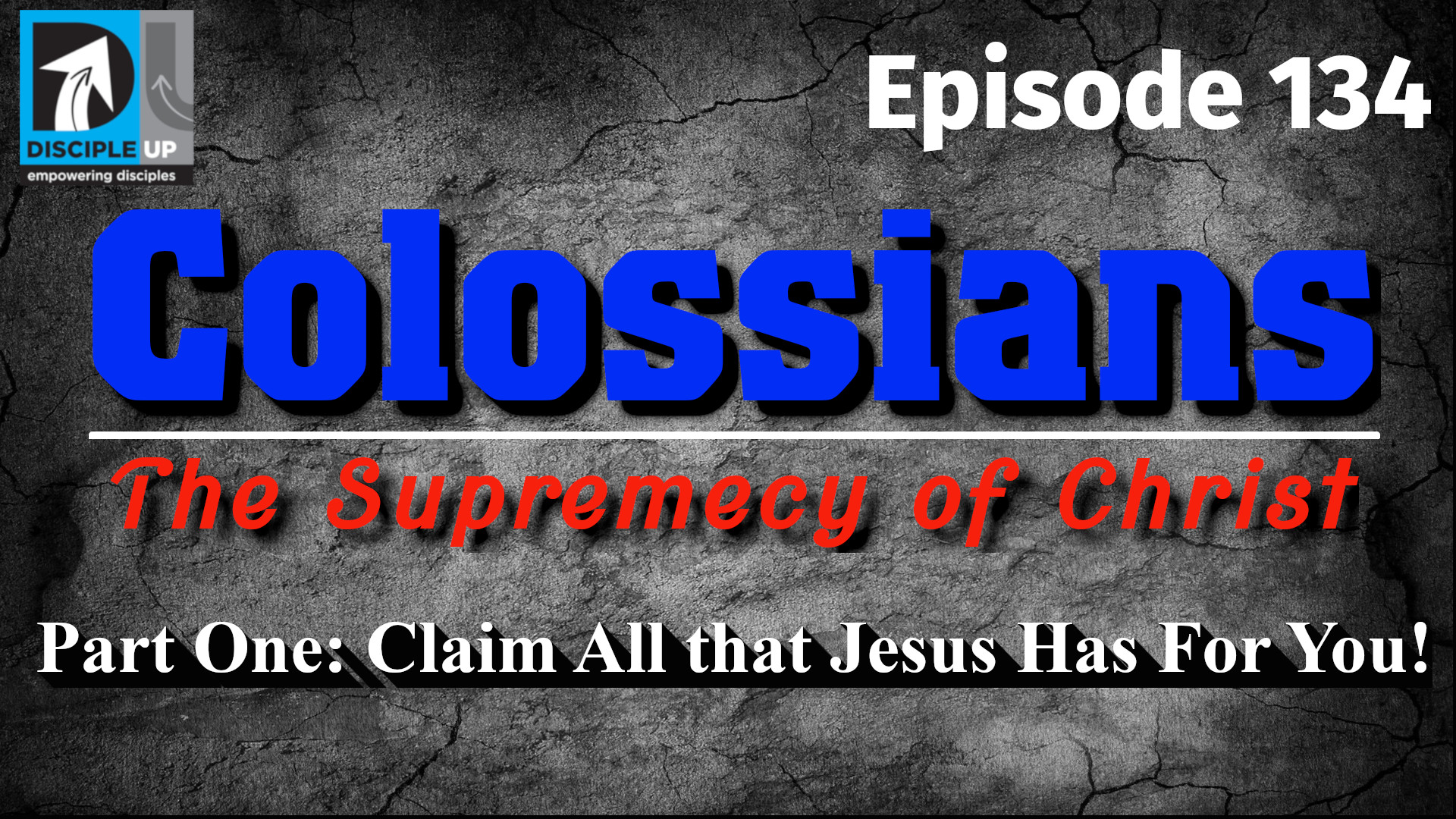Disciple Up Show Notes
The Supremacy of Christ, Colossians Pt. 2
Thank God For the Gospel!
By Louie Marsh, 11-20-2019
THANK GOD FOR THE GOSPEL!
Col. 1: 1: 1-8
Intro. Paul wrote this book around 62-63 AD probably from Rome. Colossae was in Phrygia on the Lycus river – nearby were the larger cities of Hierapolis & Laodicea. In Paul’s day Colossae was in decline – today the site is uninhabited.
This letter was written to clear up a heresy which was being taught in the church. The false teaching had not made as strong of inroads in the Colossian church that another heresy did in Galatia. We don’t know the exact form of this heresy but it appears to be some sort of cross between Judaism & the Mystery religions. It seems to be a forerunner of Gnosticism, a heresy which would nearly destroy the church in the 2nd century.
I) PAUL’S GREETING – vs. 1-2
1 Paul, an apostle of Christ Jesus by the will of God, and Timothy our brother, 2 To the saints and faithful brothers in Christ at Colossae: Grace to you and peace from God our Father. Colossians 1:1-2 (ESV)
A) Form and Substance
1, Paul follows the typical Greek form of a letter opening.
2, However, while his form is Greek the content is uniquely Christian.
a, Putting Christian content into cultural forms is part of God’s plan for reaching the world.
3, Example of typical letter – Fred, Roman Centurion to Harvey Tax preparer – “What do you mean I’m being audited??”
B) His Authority
1, Paul was an Apostle of Christ.
a, Apostle = “one clothed with the authority and endued with the power of the sender.”
b, This means that what follows isn’t just the opinion of a missionary – it’s the Word of the Almighty God – & is to be obeyed!
2, An Apostle by God’s Will
a, he didn’t get this job on the basis of his resume – it was God’s sovereign choice.
b, Since he’s never been there Paul wants them to clearly understand this.
c, None of us serve God because of our knowledge, goodness etc. We serve by His Choice which is an extension of His Grace!
C) Who His Readers Are
1, Saints.
a, ALL Christians are saints! Not just long dead nice guys!
B, How? We have been set apart by God by His Grace!
2, Faithful Brethren
a, a word of encouragement to this small and troubled church.
3, Grace and Peace
a, Grace encapsulates what salvation is all about – a free gift!
b, Peace, this word in Greek was used to translate the Hebrew Shalom, which means “wholeness.” That’s the goal of grace in our lives.
c, This comes from a God Who is our Father – not a distant god.
II) PAUL’S THANKSGIVING vs. 3-4
3 We always thank God, the Father of our Lord Jesus Christ, when we pray for you, 4 since we heard of your faith in Christ Jesus and of the love that you have for all the saints, Colossians 1:3-4 (ESV)
A) Thank God! vs. 3
1, Paul is sincere in writing this letter
a, note that he didn’t write a thanksgiving in Galatians & 2 Cor.
2, Paul praises God – not men – something the church today could learn from!
a, He recognizes work well done, as we’ll see, but true praise he reserves for God.
3, Paul, who is always bugging us to pray, practices what he preaches.
B) Faith and Love vs. 4
1, “faith in Christ” doesn’t mean that the object of their faith is Christ (though of course He is!) but the Greek refers to Christ as the sphere in which their faith works.
a, They are in Christ (vs. 2) we draw our spiritual life from Him, all that we are and can hope to become must come from HIM. We really are IN HIM!
b, to be “In Christ” is to be under His Lordship
2, Love for our brothers & sisters – the mark of the true Christian.
C) Hope, Faith & Love vs. 5
5 because of the hope laid up for you in heaven. Of this you have heard before in the word of the truth, the gospel, Colossians 1:5 (ESV)
1, Hope gives birth to this Love and Faith that we have.
a, These 3 qualities are often linked in Scripture, this is an indication of their importance. ALL 3 are needed to live a truly Christ-like life.
2, What Hope? The Greek indicates an objective hope – the 2nd coming, the resurrection, eternal life.
a, it’s objective because it’s secured for us by our Heavenly Father and our Lord Jesus, & because it’s promised to us in the Word of God
D) Thank God for the Gospel vs. 6
6 which has come to you, as indeed in the whole world it is bearing fruit and increasing—as it also does among you, since the day you heard it and understood the grace of God in truth, Colossians 1:6 (ESV)
1, The Gospel = the word of truth, as opposed to the false religions around them.
2, The Gospel’s two vital characteristics:
a, Growing
1, Colossae was on the Lycus Riv., a tributary of the Meander Riv. which was famous for it’s many curves – hence the English word.
2, The Gospel doesn’t meander – it grows – if not much where you are right now, we know it is in other places & it will grow here if we’re faithful.
b, Producing Fruit:
1, Because it’s the living (Word) logos of God it bears fruit
2, Two Fruits – reconciliation to God – and a changed life!
III) HOW THE GOSPEL CAME TO THEM vs. 7-8
7 just as you learned it from Epaphras our beloved fellow servant. He is a faithful minister of Christ on your behalf 8 and has made known to us your love in the Spirit. Colossians 1:7-8 (ESV)
A) Epaphras
1, short for Epaphraoditus – a very common name in those days – there’s no evidence that he’s the guy as Phil. 2:25, but he could be.
25 I have thought it necessary to send to you Epaphroditus my brother and fellow worker and fellow soldier, and your messenger and minister to my need, Philippians 2:25 (ESV)
2, Servant = deacon
a, who preached the Gospel, started churches, and helped Paul
b, a deacon brought them the Gospel!
B) Learning the Gospel
1, Learned is an unusual word for Paul to use in this context
2, it means Epaphras gave them a systematic instruction in the Gospel
a, perhaps like the Bereans, they too studied diligently.
3, Many people have to come to Christ this way.
a, they need more than a sermon or two, they must study it out
b, If you are dealing with someone like this, or ARE someone like this, don’t give up! Keep giving them reasons for faith. (Acts 18: 4)
4 And he reasoned in the synagogue every Sabbath, and tried to persuade Jews and Greeks. Acts 18:4 (ESV)
News Article: What Baptism Tells Us About the “Seal” of Believer’s Baptism
https://www.christianitytoday.com/news/2019/november/research-believers-baptism-teens-faith-affiliation-jssr.html
Please Get In Touch!
Email – louie@discipleup.org






Check out the Disciple Up Facebook page:

My books –















